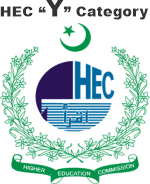RELEVANCE OF PROPHET MUHAMMAD'S ECONOMIC TEACHINGS IN ADDRESSING MODERN ECONOMIC CHALLENGES IN ISLAMIC WORLD: A QUALITATIVE REVIEW
Keywords:
Islam, Welfare, Labour, Wealth, SocietyAbstract
The research delves into the applicability of Prophet Muhammad's (peace be upon him) economic teachings in resolving current economic issues in the Islamic world. Despite having enormous natural and financial resources, most Muslim-majority nations continue to experience systemic economic challenges in the form of poverty, inequality, unemployment, and financial instability. Using a qualitative, review-based approach, this paper analyzes classical Islamic sources such as Quranic verses, hadith literature and the Prophet's biography alongside contemporary scholarship to determine the most salient economic principles from the Prophet's teachings. Financial ethics, prohibition of interest (Riba), regulation of markets, redistribution through zakat, and social justice are the themes that the analysis is based on. The implications of the conclusions are that these early Islamic economic guidelines provide workable, ethical systems for resolving many of the contemporary economic issues confronting the Islamic world today. Political, institutional, and cultural constraints are still considerable obstacles to their universal adoption. This review adds to the emergent literature on Islamic economics by re-imagining the early prophetic guidance and advancing a recontextualization of the teachings in contemporary economic policy.
Downloads
References
Al-Qardawi, Y. (1999). Fiqh az-Zakah: A comparative study of the rules of zakah according to the Qur'an and Sunnah (Vols. 1–2). Jeddah: Scientific Publishing Centre, King Abdulaziz University.
Al-Qazwini, M. Y., (887). Sunan Ibn Majah. Translated by Nasiruddin al-Khattab. (2007). Riyadh: Dar-us-Salam
Al-Quran
Al-Tirmidhi, M. E., (884). Jami al-Tirmidhi. Translated by Abu Khaliyl. (2007). Riyadh: Dar-us-Salam
Bukhari, M. I., translator Khan, M. M. (1997). The translation of the meanings of Ṣahih AL-Bukhari: Arabic-English. Riyadh: Darussalam.
Chapra, M. U. (1985). Towards a just monetary system: A discussion of money, banking, and monetary policy in the light of Islamic teachings. The Islamic Foundation.
Chapra, M. U. (2016). The future of economics: An Islamic perspective. Kube Publishing.
COMCEC. (2023). Summary Report on Trade. Retrieved from https://www.comcec.org/wp-content/uploads/2023/11/1-Summary-report-on-trade.pdf
Ghazali, A. H., (1105). Revival of Religion's Sciences (Ihya' Ulum Ad-Din). Translated by Mohammad Mahdi al-Sharif. (2011). Beirut-Lebanon: Dar Al-Kotob Al-llmiyah
Hisham, I., (833). Sirat Ibn Hisham: Biography of the Prophet. Translated by Inas A. Farid. (2000). Egypt: Al Falah Foundation
Islamic Development Bank. (2023). Cherishing Our Past Charting Our Future. Retrieved from: https://2023.ar.isdb.org/wp-content/uploads/2024/04/IsDB_AR23_EN_WEB_V2.pdf
Kahf, M. (1978). The Islamic economy: Analytical study of the functioning of the Islamic economic system.
Kato, T. (2022). Islamic and capitalist economies: Comparison using econophysics models of wealth exchange and redistribution. PLOS ONE, 17(9), e0275113. https://doi.org/10.1371/journal.pone.0275113
Khaldun, I., (1377). Al-Muqaddimah: An Introduction to History. Translated and introduced by Franz Rosenthal (2005), Princeton University Press.
Khan, M. A. (1994). An introduction to Islamic economics. Islamabad: International Institute of Islamic Thought (IIIT).
Mawdudi, A. A. (2011). First Principles of Islamic Economics. UK: The Islamic Foundation
Muslim, A. H., translator al-Khattab, N. (2007). English Translation of Sahih Muslim. Riyadh: Darussalam.
Rokan, M. K. (2020). 'Market Justice from Islamic Business Ethics Perspective', Journal of Sharia Law Research, 5(2), pp.177-192
Sarea, A. (2012). Zakat as a Benchmark to Evaluate Economic Growth: An Alternative Approach. International Journal of Business and Social Science, 3(18), 242-245.
SESRIC. (2023). OIC Economic Outlook 2023. The Rise of the Digital Economy and Bridging the Digital Divide. Retrieved from https://sesricdiag.blob.core.windows.net/sesric-site-blob/files/article/856.pdf
Siddiqi, M. N. (1996). Role of the state in the economy: An Islamic perspective. The Islamic Foundation.
Siddiqi, M. N. (2012). Future of Islamic Economics. The Islamic Institute, KAU Jeddah. (retrieved from: http://www.siddiqi.com/mns/future_of_islamic_economics.html)
Siddiqi, M. N. (1981). Muslim economic thinking: A survey of contemporary literature. UK: The Islamic Foundation
Taymiya, I. (1982). Public duties in Islam: The institution of the Hisba. UK: The Islamic Foundation.
The Religion-State Relationship and the Right to Freedom of Religion or Belief: A Comparative Textual Analysis of the Constitutions of Majority Muslim Countries and Other OIC Members. (2012). Special report by USCIRF (Retrieved from https://www.uscirf.gov/)

Downloads
Published
Issue
Section
License
Copyright (c) 2025 PAKISTAN ISLAMICUS (An International Journal of Islamic & Social Sciences)

This work is licensed under a Creative Commons Attribution 4.0 International License.
This work is licensed under a Creative Commons Attribution 4.0 International License.
































